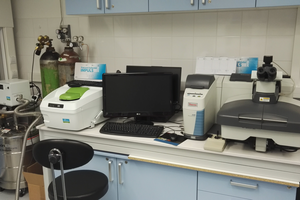
DXR Raman microscope
Thermo Scientific DXR Raman microscope interfaced to an Olympus microscope equipped with the set of excitation lasers 445, 532, 633 and 780 nm used for solid state micro-samples characterization. This ...

Design, synthesis, and applications
CUCAM – is a Centre of Excellence focused on research in advanced materials. It has been established under the Chemistry Section at the Faculty of Science based on a support from Ministry of Education, Youth and Sports (OP VVV “Excellent Research Teams”, project No. CZ.02.1.01/0.0/0.0/15_003/0000417).
a world-leading Centre of Excellence in Advanced Materials located at Charles University (CU) in Prague, specialising in the Design, Synthesis and Application.
is on the use of modular (i.e. low dimensional) building units for the preparation of new advanced materials, with a particular emphasis on the preparation of hybrid solids.
is to overturn the conventional thinking and practice in materials science by developing methodologies that can target ‘unfeasible’ materials – that is, materials which cannot be prepared by traditional methods.
open up routes to materials that have different properties (both chemical and topological) to those we currently have, which in turn opens up new avenues for exploitation.
The goal is to develop the science and the human capital at Charles University, positioning the Centre at the forefront of this field and building an international network of collaborators and partners that cements the position of the research as a globally recognized brand. An important aspect of this is to develop the capacity of the researchers to develop industrial and commercial links to exploit novel and inventive research findings.
Strategy
We work on creative and innovative chemistry that impacts across a wide range of different areas of science and technology.
Our particular focus is in advanced materials, but we are looking outwards to cross borders between scientific fields.
We are building and leading strong networks of scientists that transcend the traditional boundaries.
The key scientific advances
● The development of new chemistry concepts that will allow step changes in exploitation of the outstanding properties of advanced materials in a way that has not been possible previously.
● The development of generalised synthetic strategies to target novel properties, and subsequent demonstration of these properties.
● The use of world-leading characterisation and computational techniques to connect novel chemistry to new properties through transformative synthetic chemistry, structural characterisation and computational prediction and simulation.
THEMES

Thermo Scientific DXR Raman microscope interfaced to an Olympus microscope equipped with the set of excitation lasers 445, 532, 633 and 780 nm used for solid state micro-samples characterization. This ...
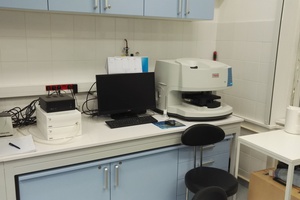
Thermo Scientific iN10 FTIR microscope equipped with dual detector system (DTGS, MCT) is used for solid state micro-samples characterization and mapping in transmission, reflection and ATR modes (Ge crystal).
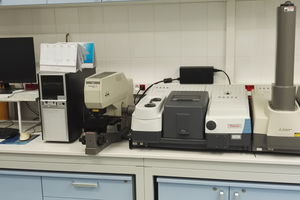
Combined spectroscopic system based on FTIR spectrometer Thermo Nicolet 6700 (50-12000 cm-1) and FT-Raman module Thermo Nicolet Nexus (100-3700 cm-1), Nd: YVO4 laser 1064 nm). The system ...
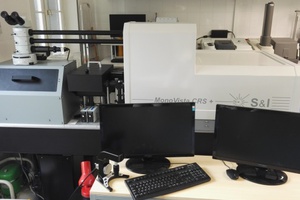
The research grade micro/macro Raman system MonoVista CRS+ (Spectroscopy & Imaging GmbH, Germany) interfaced to an Olympus microscope equipped with 532 and 785 nm excitation lasers. This system enables ...
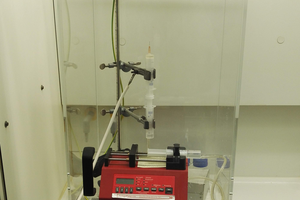
Laboratory electrospinning equipment for preparation of photoactive nanofiber membranes. The laboratory setup consists of a syringe needle connected to a high-voltage (5 to 50 kV) direct current power supply, a ...
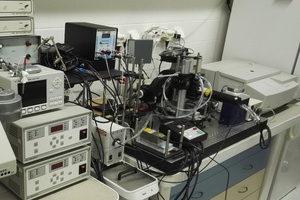
Laboratory set-up for irradiation experiments including light sources (lasers, solar simulator), light detectors and detectors for O2 and NO. We are using this for all light-activated experiments, using monochromatic ...
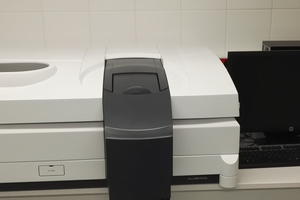
Varian 4000 UV-VIS spectrometer (Agilent, USA) equipped with an integration sphere can be used in transmission or reflection mode. Integrating spheres are ideal for measuring the transmission of turbid, translucent ...
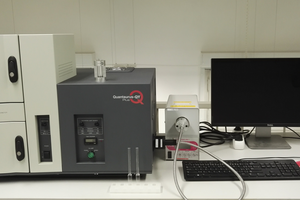
Quantaurus-QY Plus spectrofluorimeter (Hamamatsu, Japan) is designed to measure the instantaneous absolute value of emission quantum yield using the photoluminescence method. We are using the machine for measuring quantum yields ...
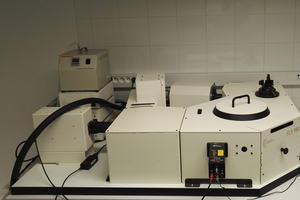
FLS 980 spectrofluorimeter (Edinburgh Instruments, UK). Two detectors (single photon counting PMTs are available to cover the wavelength range from 200 nm – 1700 nm) with independent exit slits and three ...
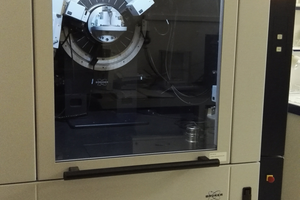
Bruker D8 ADVANCE powder diffractometer allows to be operated in three modes:
reflection measurements using the Bragg-Brentano parafocussing arrangement,
reflection measurements using the parallel-beam arrangement,
transmission measurements.
The instrument is ...
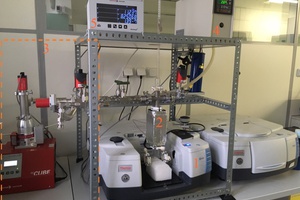
Nicolet™ iS50 FTIR Spectrometer equipped with two MCT/B and two DTGS detectors is a core of sophisticated system exploited to investigate surface chemistry of nanomaterials. In-situ set-up (shown in ...
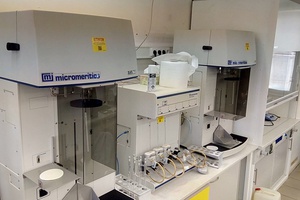
The laboratory is equipped with Micromeritics 3Flex volumetric Surface Area Analyzer for determining textural properties of solid materials. The instrument allows measurements of total surface area, pore volume and calculation ...
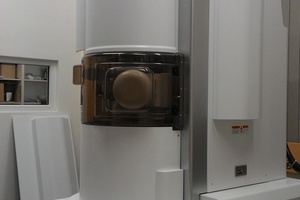
JEOL JEM-NeoARM 200F Microscope is equipped with: • Schottky-type Field Emission Gun (30-200 kV voltage) • Condenser Lens with Cs aberration correction • CMOS camera (4096 x 4096 pixels, up to 200 fps ...
Presentations from CUCAM WORKSHOP (February 8, 2017)
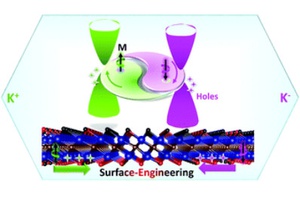
Journal of Materials Chemistry C , 9, 11132-11141 (2021)
Shuo Li, Junjie He, Lukáš Grajciar and Petr Nachtigall
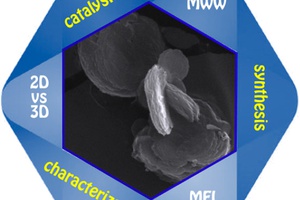
ACS Catalysis, 11(4), 2366–2396. (2021) link
Shamzhy, M., Gil, B., Opanasenko, M., Roth, W. J., Čejka, J.
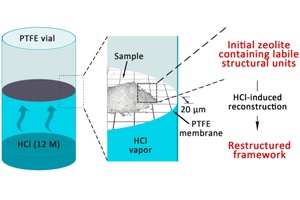
Researchers from the Department of Physical and Macromolecular Chemistry (Valeryia Kasneryk, Mariya Shamzhy, Qiudi Yue, Michal Mazur, Russell E. Morris, Jiří Čejka and Maksym Opanasenko), in collaboration with colleagues from ...